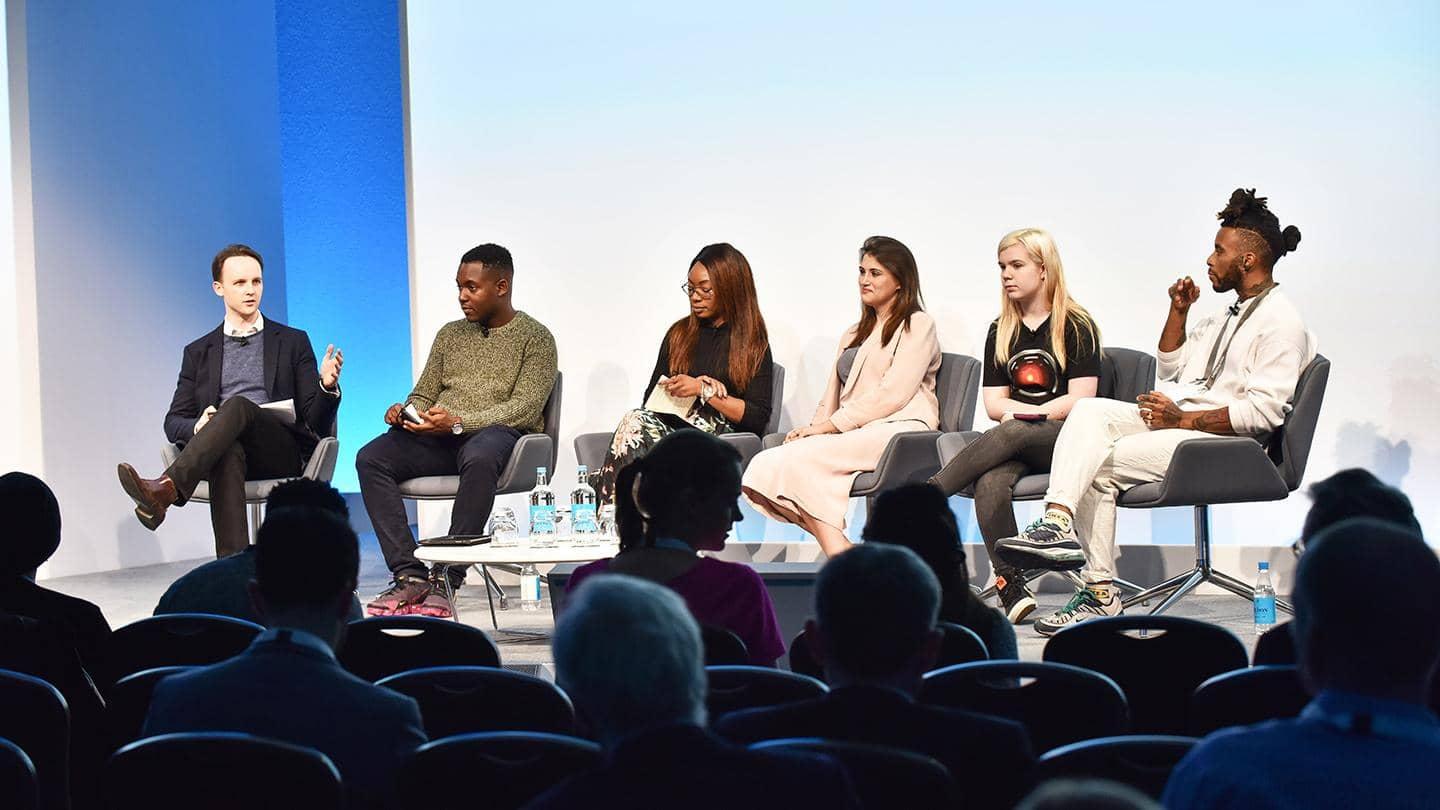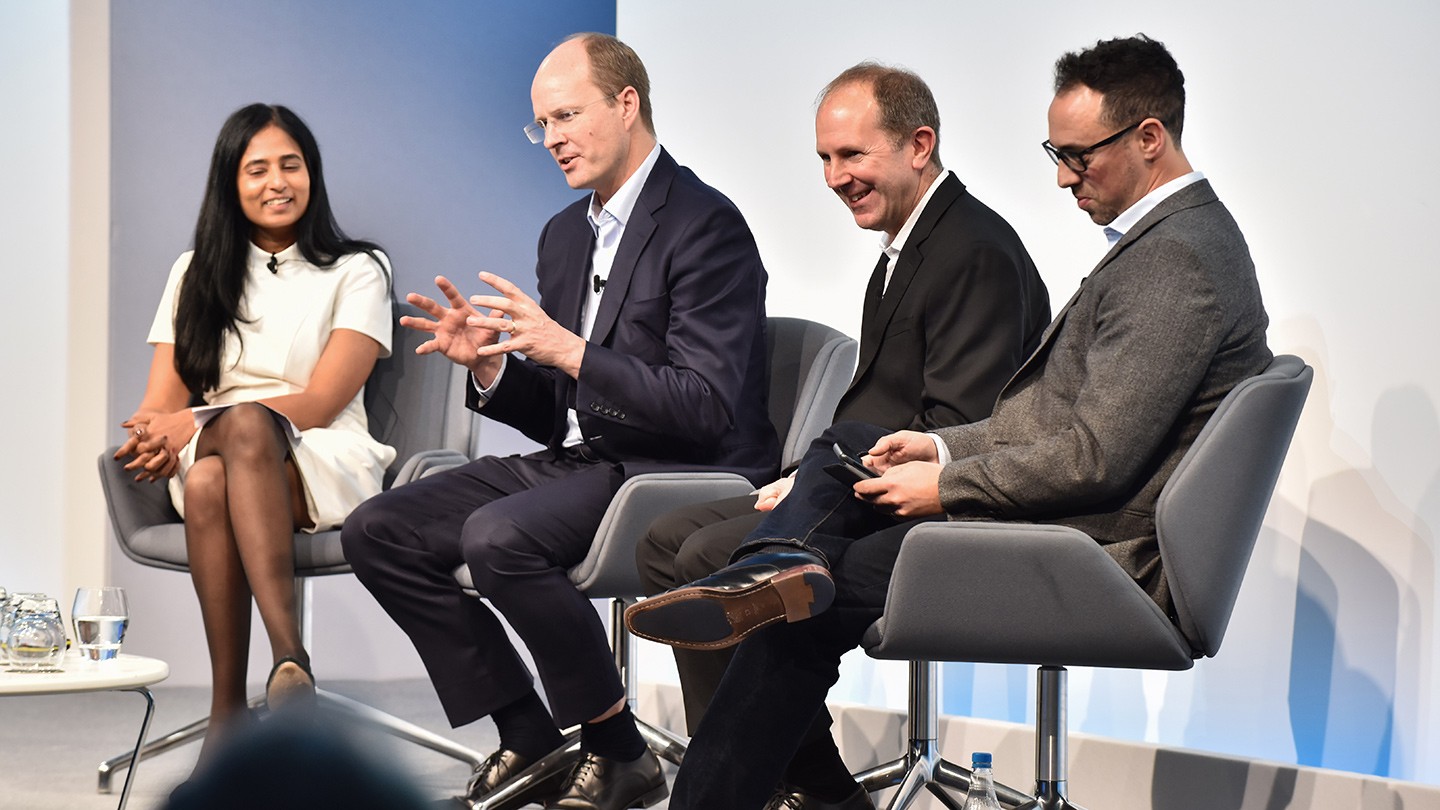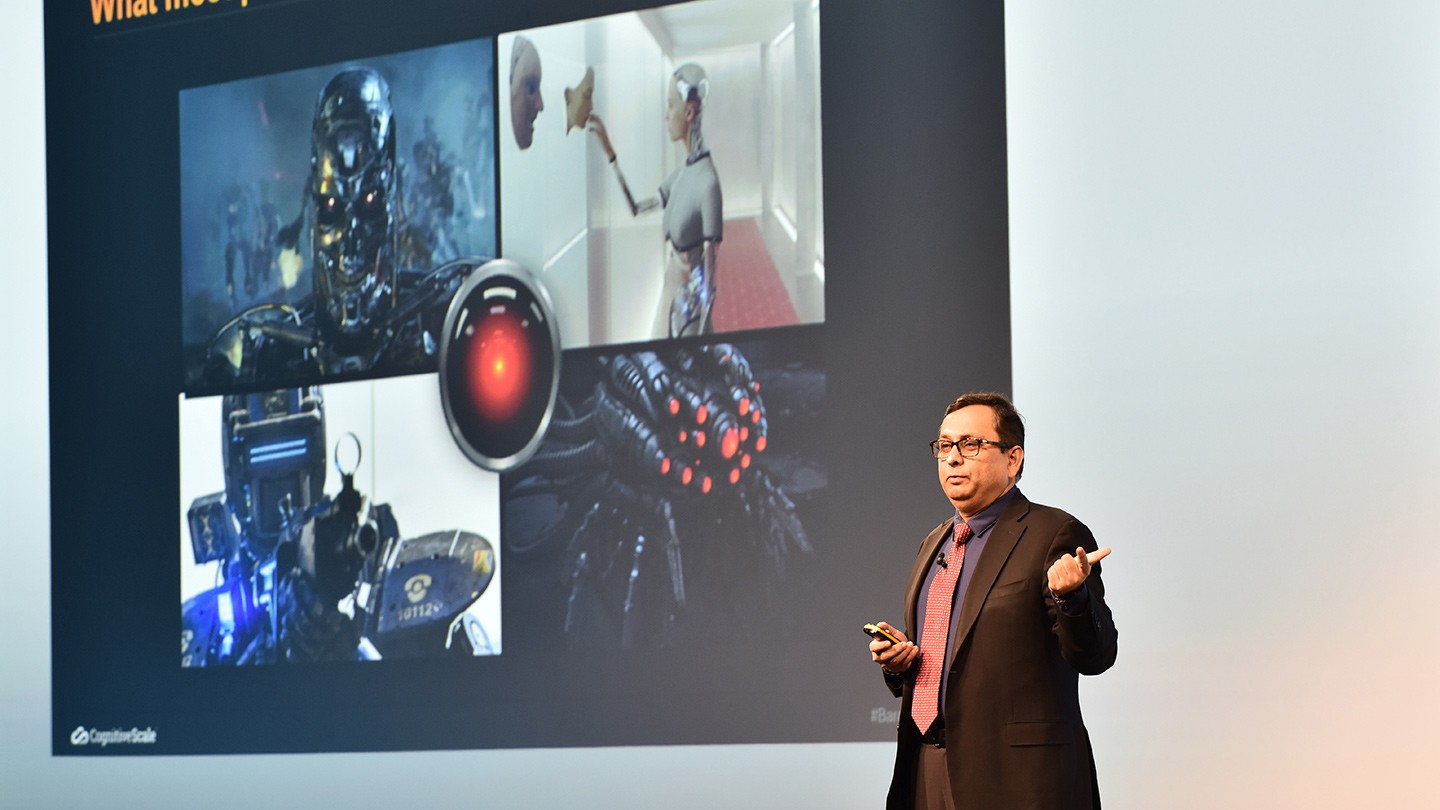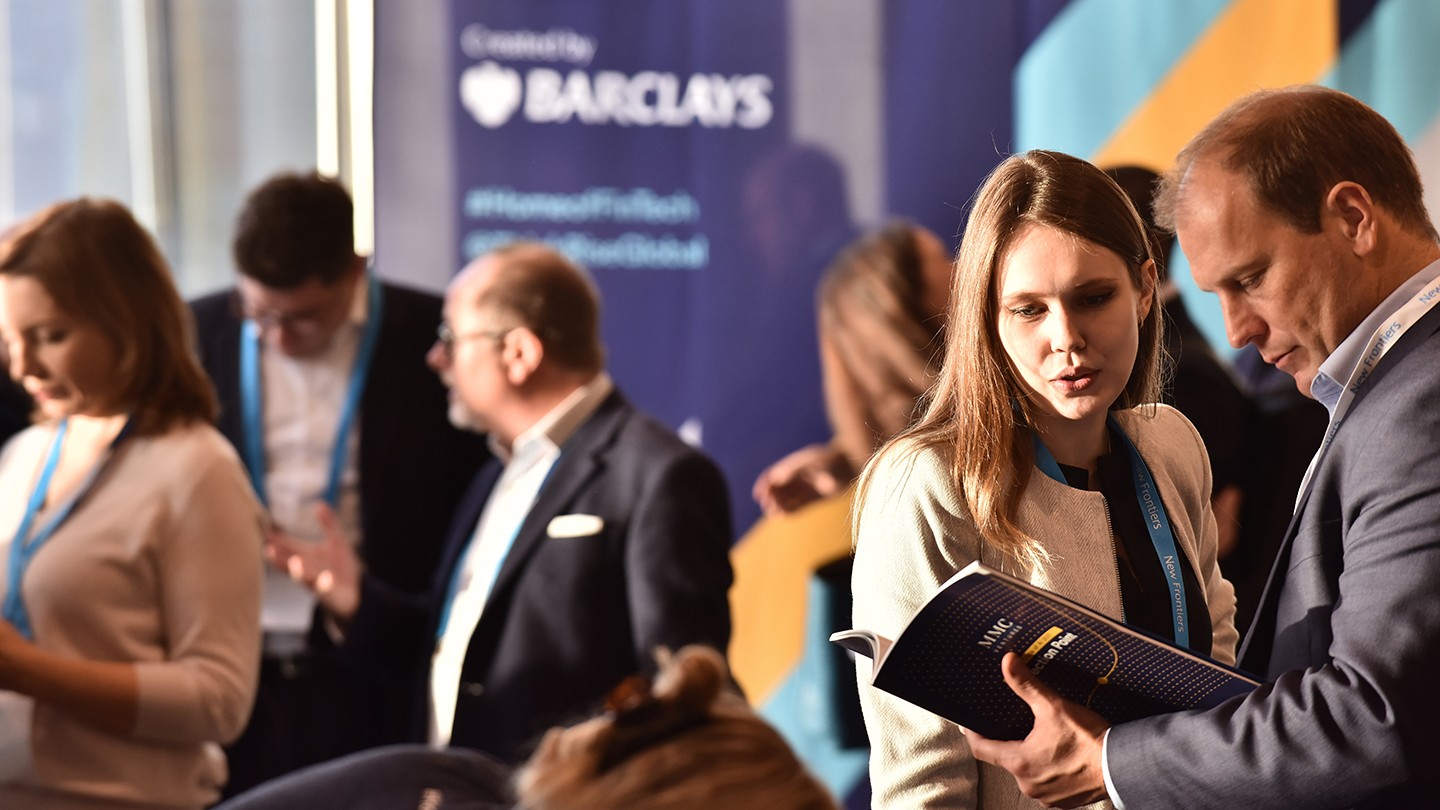
Innovation
New Frontiers 2018: ten takeaways
More than 400 technologists, innovators, investors and entrepreneurs gathered for Barclays’ fifth annual New Frontiers conference last week to consider everything from the ethics of AI and promoting sustainability to the implications of quantum computing and the pace of technological change. Here are our highlights.

(L-R) Asita Anche, Barclays Head of Markets Quantitative eTrading and Data Science; Ted Moynihan, Partner and Global Head of Financial Services at Oliver Wyman; Richard Lloyd, Chairman of Resolver; Jonathan Hirshler, Co-founder and CEO of Signify Group
1. AI is about improving the human condition
“We’re at the ‘dog looking at the television’ stage of artificial intelligence,” said AI guru Manoj Saxena, Executive Chairman of CognitiveScale, suggesting that understanding of the technology’s power is in its infancy. “People think that AI is either going to kill me or take my job,” he said, “but it’s about improving the human condition.”
Correcting the impression that AI is all about machine learning and instead categorising it as a convergence of the “big six: cloud, social, big data, mobile, machine learning and blockchain”, Saxena saw a future of “self-driving business systems, with humans in the loop.” Other panellists noted that AI in audit, for example, would not reduce the need for auditors but would instead allow them to do their job more effectively. “Whoever leads in AI will rule the world,” said Saxena.
2. Can artificial intelligence avoid human bias?
“Hype around AI is at its peak,” said David Kelnar of MMC Ventures, “but there’s a paradigm shift in tech that warrants this.” As the applications of AI increase, ethical questions come to the forefront, and were consistently addressed throughout the conference.
Manoj Saxena considered how to build fairness into AI, conscious of the impact that will be felt if systems are biased, while on a separate panel, Kelnar saw the danger of AI data sets embedding historic prejudices around race and gender, potentially meaning that “far from freeing the systems from biases, we embed those systems with the same biases that have held us back for decades”.
Barclays UK CEO Ashok Vaswani noted that Barclays had a responsibility to ensure that its use of AI reflected the bank’s corporate values, while Barclays UK Chairman Sir Ian Cheshire was keen to avoid unintended consequences: “It’s not acceptable to view technology in a vacuum. We have to understand the social context, how it can be used for good and bad, and how we embed our technologies in a responsible way."
3. Mining the ethics of big data
A number of contributors spoke about how having complete trust in what your bank does with data will be as important as being confident that your money is secure. “Everything we do produces data,” said Barclays CEO Jes Staley, “and data is something that’s going to inform how we engage with our customers and clients, how we deal with risk, and how we engage with our regulators.” Key Barclays figures, from Vaswani to Cheshire to Group Chief of Staff, Sasha Wiggins, reiterated the “responsibility for data” as being one of the consistent themes of the conference

Manoj Saxena, Executive Chairman of CognitiveScale
4. Tech companies can be a bank’s “extended R&D team”
Manoj Saxena saw banks embracing fintech start-ups as “an extended R&D team”, and a lot of thought throughout the conference went on considering the new types of partnerships that would drive innovation in the financial services sector and beyond.
Jes Staley said: “Having a conference likes this brings together people that very likely may be competing with Barclays 10 or 15 years down the road, but we may want to partner in the next five years.” One of those people, Anil Stocker, CEO of Barclays-partnered fintech MarketInvoice, echoed the view of Barclays as having a “top-down, founder-led view despite it being a big corporate – where the organisation is partner with companies that they might ultimately compete with”.

Barclays played host to some of the leading disrupters in technology
5. Clean tech is an enormous opportunity
Manjula Lee, CEO of social problem-solving enterprise the World Wide Generation, said that corporations are realising that they can lift people out of poverty while simultaneously developing an enormous consumer market. “We have 3 billion people that live off less than £2.50 a day – they are completely off the grid,” she said, explaining that addressing this is not only an ethical thing to do, but “poses one of the biggest economic opportunities of all time”.
Peter Horsburgh, Chairman and Founding Partner at Environmental Technologies Fund, highlighted the importance of a joined-up approach to sustainability – one that relies on corporations, entrepreneurs and governments. “Governments don’t create sustainability. Individuals, venture funds and entrepreneurs do that, but you have to make it possible for them,” he said.
6. Listening to the native speakers
With so much discussion on innovation and the future of technology, the conference also heard from the people who play the biggest part in moulding that future, at a seminar titled, ‘Generation Z: the truly digital natives’.
Kari Lawler, 15-year-old founder of Youth4AI, said: “The tools are there to be entrepreneurial. If I type something into my phone there is an entire YouTube tutorial on it and I can learn it by the end of the day.” Discussing how businesses can ensure they attract the best Gen Z talent, Ella Robertson, Managing Director of One Young World, said that a company’s social impact is now more important than ever: “Gen Z are the first generation that will take a pay cut to work for a company that is better socially.”

7. The virtual and real worlds will become one
A conversation between Barclays’ Matt Hammerstein and Matt Warman MP, a former Technology Editor at The Daily Telegraph, focussed on the social impact of technology, from the overuse of smartphones to freedom of speech to the effects of social media.
Wrestling with the politics and philosophy of state intervention in the digital world, Warman said that “the idea that the digital and physical worlds are two different places is something that at some time we’ll move along from”.
8. Preparing for a quantum leap
“Quantum computing is to modern tech as the digital computer is to the abacus,” said Professor Ian Walmsley of Imperial College, London. “There’s quite a broad range of applications, which will allow us to discover new molecules, materials, rigid structures. They’re also good at optimisation problems and might change how you do logistics.“
Ilyas Khan, CEO of Cambridge Quantum Computing, speculated that in less than five years there could be fully quantum machine learning. “Don’t ignore it,” said Dr Anthony Annunziata of IBM, “it’s coming quicker than you think and it will impact business in a substantive way. It’s not an easy subject and will be difficult to follow quickly if you postpone, but every organisation should identify people who are quantum leads, find out what it is and how it works.”
9. Who knows what’s next?
In a keynote speech, Philip Colligan, CEO of the computer science education charity Raspberry Pi Foundation, remembered that the foundation’s original goal was to sell 10,000 small computers to inspire a new generation of engineers. They have now sold more than 20 million.
The idea that nobody can entirely predict the next big thing was augmented by Manoj Saxena talking about investors accepting a 10% success rate with the potential for a 100 multiple return, and by Sir Ian Cheshire invoking the invention and growth of the smartphone in the last decade as something that companies like Barclays could not have fully predicted – but which changed their business model entirely.
10. Opportunity is a two-way street
Away from the main conference floor, the ‘Opportunity Street’ exhibition showcased new technologies and companies drawn from the Barclays orbit of clients and partners, as well as internal teams covering AI, fraud prevention, market insights and Digital Eagles. Graduates from the Barclays Accelerator, including Crowdz and Shieldpay, took the opportunity to demonstrate their products to the audience of bankers, technologists and investors.
On stage, in the ‘FinTech: Unleashing the power of collaboration’ panel, another Accelerator alumnus, Matty Cusden-Ross of digital receipts company Flux, gave his insights about dealing and partnering with Barclays and the mutually beneficial two-way street of flexibility and scale that characterises the relationship between a start-up and a legacy bank.